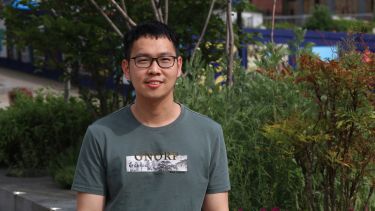I chose to live in şů«Ӱҵ because it's one of the most internationalised cities in the region

Why did you stay at şů«Ӱҵ?
I chose to live in şů«Ӱҵ because it's one of the most internationalised cities in the region. It's vibrant but without the metropolitan hustle and bustle, as one could also enjoy the hilly and idyllic scenery whilst living in the city.
Why are you doing a PhD?
Well. My decision to undertake a PhD is purely based upon my own interest in Slavonic languages, and therefore, I was encouraged to carry out a more in-depth research, which is, in a sense, a continuation of my previous work done in Master's at the University.
What’s the focus of your research?
My current research is concerned with the mutual intelligibility (MI) between different Belarusian varieties and Polish. Are different Belarusian dialect speakers able to understand their neighbouring West Slavonic (Polish)? to what extent? While it seems to be simply a yes-or-no question in the view of most non-linguists, the interplay of a wide range of linguistic and socio/ethno-linguistic factors that could potentially impact the speakers' perception of another closely-related language is worth studying, and honestly speaking, I'm playing a role in filling in the existing knowledge gap in the field of mutual intelligibility in Slavonic.
What’s it like being a postgraduate in the School of Languages & Cultures?
Honestly speaking, it is a joyful experience as a postgraduate in the School, as the university teams are quite supportive and are there to help you sort your issues out. Besides, you have many opportunities to participate in school's events and conferences.
How did you find the first few months in particular?
the beginning of these months was a little challenging for me, as I need to resolve a lot of issues (from visa to accommodation), while engaging in my weighty academic works.
What’s your highlight of studying in şů«Ӱҵ?
Studying at şů«Ӱҵ is not quite challenging as I previously expected, because the School provided a relatively flexible and individualised arrangement for every postgraduate in order to unleash my potential.
What support do you receive from your supervisors?
in addition to the supervisory meetings, my supervisors helped me both mentally and academically in overcoming the difficulties in finding resources, or getting in touch with other linguists or Slavists, when I was daunted or timid to contact others for help.
What are your plans for after your PhD?
I have some quite ambitious plans after the completion of my PhD: Maybe I will be able to apply for a post-doctoral position in educational institutions or universities. I'm also interested in being an interpreter or a translator that can provide seamless and accurate translations for legal and commercial documents, while in the meantime, I'm doing translation works of some Russian novels and humour from Russian into Chinese during my spare time.
Can you describe the School in 3 words?
Hospitality, Integrity and Fraternity
Is there anything else you would like to add, that isn't covered by the questions above?
My previous educational background (majors) and my research interest:
B.A. University of Minnesota (Majors: Spanish and Russian Languages)
M.A. University of şů«Ӱҵ (Russian Studies)

